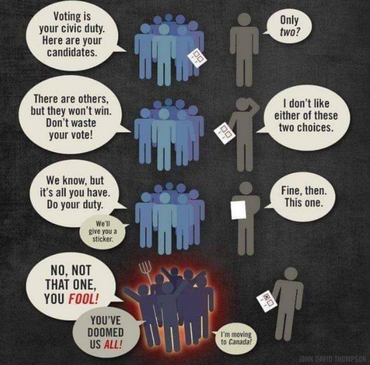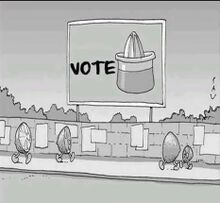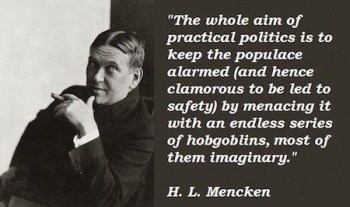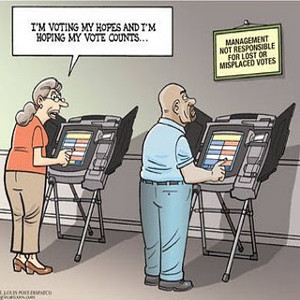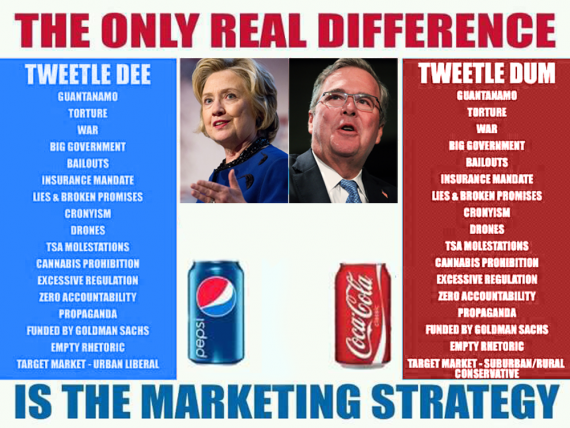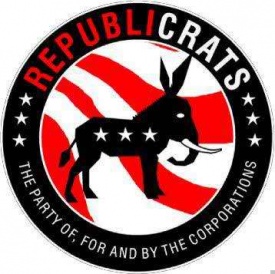Difference between revisions of "Political party"
(stub) |
|||
| (41 intermediate revisions by 4 users not shown) | |||
| Line 1: | Line 1: | ||
{{concept | {{concept | ||
| − | |wikipedia= | + | |wikipedia=https://en.wikipedia.org/wiki/Political_party |
|image=Party_politics.jpg | |image=Party_politics.jpg | ||
| + | |image_width=400px | ||
| + | |constitutes=front | ||
| + | |key_properties=Start/Description | ||
| + | |key_property_headers=Start/Description | ||
| + | |description="The whole aim of practical politics is to keep the populace alarmed (and hence clamorous to be led to safety) by menacing it with an endless series of hobgoblins, most of them imaginary." | ||
| + | |wikiquote=http://en.wikiquote.org/wiki/Political_party | ||
}} | }} | ||
| + | '''Political parties''' are organised groups which work within the system of [[voting]] used by most "[[democracies]]". Although they occupy (by definition) the space of shallow [[politics]], they can often be important groups to study for the student of [[deep politics]], provided that a certain circumspection is exercised regarding their pronouncements and imputed motives. | ||
| + | |||
==Official narrative== | ==Official narrative== | ||
| − | The | + | [[image:official narrative political choice.png|right|370px]] |
| − | + | The [[official narrative]] of representative democracy is probably well known to almost all readers of [[Wikispooks]]. Those represented cast a 'vote' for a limited number of possible candidates, and those most supported are elected to power. Very commonly, this "choice" is limited to a handful of candidates, sometimes just two. | |
| − | |||
| − | |||
| + | ===Official opposition narrative=== | ||
| + | The [[official opposition narrative]] of party politics and "[[democracy]]" is that "politics is broken", as always with official narratives, never calling into question the good intents of those who created the system, or allowing the possibility that it is in fact working as intended.<ref>http://www.newscientist.com/article/mg22630182.800-technology-can-give-political-power-back-to-the-people.html</ref> | ||
| + | |||
| + | ==Problems== | ||
| + | [[image:vote-squeezer.jpg|220px|right]] | ||
| + | [[Joseph Goebbels]] wrote about [[Corporate_media#Consolidation|corporate media]] that people can be easily controlled by a system that ''pretends to offer a diversity'' of opinion but is actually uniform. Similarly, many people can be effectively steered by offering them an apparent choice of government which is in fact no real choice at all. There is a certain amount of "buy in" - people who have voted are reluctant to admit that their vote was meaningless, and conversely, the fact that they appear to have chosen a "leader" makes it that much easier for them to submit to that leader's commands. As [[Goethe]] once wrote, "None are more hopelessly enslaved than those who falsely believe they are free." | ||
| + | |||
| + | {{SMWQ | ||
| + | |authors=John Taylor Gatto | ||
| + | |subjects=party politics, democracy | ||
| + | |text=It doesn't make the ''slightest'' difference whether [[Republicans]] have control of [[congress]] or [[democrats]]. ''They're the same people''. Look at their campaign contributions. | ||
| + | |source_URL=http://www.unwelcomeguests.net/564 | ||
| + | |source_name=Unwelcome Guests | ||
| + | |source_details=#564 | ||
| + | }} | ||
| + | [[image:party politics trolley problem.png|left|280px|thumbnail|A rendering of party politics as a [[trolley problem]]]] | ||
| + | Many [[Wikispooks]] readers will likely be of the opinion (for which this website provides a lot of evidence) that (in the 21<sup>st</sup> century at least) the political process is best understood as a [[fraud]] used to conceal the business of [[deep politics]]. Almost all national "leaders" are in fact mere [[puppet leader|puppets]] of concealed forces. Things have only got worse since [[Gore Vidal]] observed back in the 1970s: | ||
| + | {{SMWQ | ||
| + | |eio=0 | ||
| + | |text='''There is only one party in the [[United States]], the Property Party ... and it has two right wings:''' [[Republican Party]] and [[Democrat]]. Republicans are a bit stupider, more rigid, more doctrinaire in their laissez-faire [[capitalism]] than the Democrats, who are cuter, prettier, a bit more corrupt — until recently ... and more willing than the Republicans to make small adjustments when the poor, the black, the anti-imperialists get out of hand. But, essentially, there is no difference between the two parties. | ||
| + | |date=1977 | ||
| + | |authors=Gore Vidal | ||
| + | |source_name=Matters of Fact and of Fiction: Essays 1973–1976 | ||
| + | |source_details=Random House. p. 268. ISBN 0-394-41128-5 | ||
| + | }} | ||
| + | |||
| + | ==Strategy of tension== | ||
| + | {{FA|Strategy of tension}} | ||
| + | [[image:HLMenkenonSOT.jpg|350px|right]] | ||
| + | The party political process provides an effective distraction, particularly when supported by a craven [[mass media]], to provide distraction, cloaking of [[deep political]] events, and sometimes also the terrorisation of a compliant populace. As [[H. L. Mencken]] put it in 1918 {{SMWQ | ||
| + | |format=inline | ||
| + | |date=1918 | ||
| + | |text=the whole aim of practical politics is to keep the populace alarmed (and hence clamorous to be led to safety) by menacing it with an endless series of hobgoblins, most of them imaginary. | ||
| + | |source_name=Wikiquote | ||
| + | |source_URL=https://en.wikiquote.org/wiki/H._L._Mencken | ||
| + | |authors=H. L. Mencken | ||
| + | |subjects=strategy of tension, fear, politics, terrorisation | ||
| + | }} | ||
| + | |||
| + | [[image:Voting fraud.jpg|left|370px]] | ||
| + | |||
| + | ==Electoral fraud== | ||
| + | {{FA|Electoral fraud}} | ||
| + | In some countries, notably [[USA]], paper ballots have been either partly or wholly replaced by electronic voting systems. Since these leave no conventional paper trial, they are open to abuse. A mound of evidence exists both that many of the voting machines are easily hacked<ref>http://www.activistpost.com/2015/08/flashback-voting-machines-can-be-hacked-with-26-and-an-8th-grade-education.html</ref>, that this is ''not'' accidental<ref>http://www.westernjournalism.com/vote-fraud-diebold-whistleblower-speaks-out/</ref>, and that the 2004 US election was decided as a result of fraudulent use of voting technology.<ref>http://www.unwelcomeguests.net/163</ref><ref>http://www.dkosopedia.com/wiki/Election_integrity_timeline</ref> | ||
| + | |||
| + | ==Fraud by politicians== | ||
| + | In most (if not all?) countries, politicians are ''not'' mandated to keep their pre-election promises, so it is perfectly legal (and far from uncommon) for them to say "Vote for me, I'm going to do something", then once they are elected either not to do it, or to do the exact opposite. The can hardly be an oversight of the legal system, and so can be seen as a sign that the political system is not ''broken'', but is in fact functioning as designed. In the UK in 2007 the [[Misrepresentation of the People Act]] was proposed, to allow the prosecution of politicians for lying. As of 2015, it has attracted the support of only 37 out of 646 members of parliament.<ref>http://www.unwelcomeguests.net/673</ref><ref>https://en.wikipedia.org/wiki/Misrepresentation_of_the_People_Act</ref> | ||
| + | |||
| + | [[image:US2016election.png|right|570px]] | ||
| + | |||
| + | ==United States presidential election, 2016== | ||
| + | [[image:republicrats.jpg|275px|left]] | ||
| + | {{FA|United States presidential election, 2016}} | ||
| + | The United States presidential election planned for 2016 presents an excellent example of the fake choice offered by so-called "[[democracies]]". Neither [[Hillary Clinton]] nor [[Jeb Bush]] can be expected to challenge the interests of [[the cabal]] that has backed them. One result of the blatantness of the choice being offered to voters is that many media commentators have remarked upon the matter.<ref>http://whowhatwhy.org/2015/06/16/jeb-bush-and-hillary-clinton-one-party-ticket/</ref><ref>http://www.politico.com/story/2015/06/hillary-clinton-jeb-bush-similarities-119036.html</ref> | ||
{{SMWDocs}} | {{SMWDocs}} | ||
| − | == | + | ==References== |
{{reflist}} | {{reflist}} | ||
| − | |||
Latest revision as of 17:30, 26 May 2023
(front) | |
|---|---|
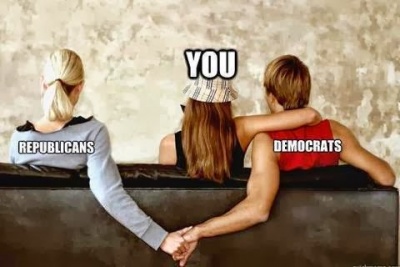 | |
| "The whole aim of practical politics is to keep the populace alarmed (and hence clamorous to be led to safety) by menacing it with an endless series of hobgoblins, most of them imaginary." |
Political parties are organised groups which work within the system of voting used by most "democracies". Although they occupy (by definition) the space of shallow politics, they can often be important groups to study for the student of deep politics, provided that a certain circumspection is exercised regarding their pronouncements and imputed motives.
Contents
Official narrative
The official narrative of representative democracy is probably well known to almost all readers of Wikispooks. Those represented cast a 'vote' for a limited number of possible candidates, and those most supported are elected to power. Very commonly, this "choice" is limited to a handful of candidates, sometimes just two.
Official opposition narrative
The official opposition narrative of party politics and "democracy" is that "politics is broken", as always with official narratives, never calling into question the good intents of those who created the system, or allowing the possibility that it is in fact working as intended.[1]
Problems
Joseph Goebbels wrote about corporate media that people can be easily controlled by a system that pretends to offer a diversity of opinion but is actually uniform. Similarly, many people can be effectively steered by offering them an apparent choice of government which is in fact no real choice at all. There is a certain amount of "buy in" - people who have voted are reluctant to admit that their vote was meaningless, and conversely, the fact that they appear to have chosen a "leader" makes it that much easier for them to submit to that leader's commands. As Goethe once wrote, "None are more hopelessly enslaved than those who falsely believe they are free."
“It doesn't make the slightest difference whether Republicans have control of congress or democrats. They're the same people. Look at their campaign contributions.”
John Taylor Gatto [2]
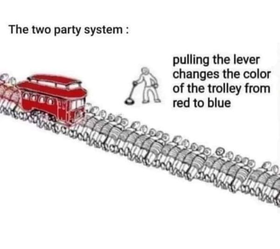
Many Wikispooks readers will likely be of the opinion (for which this website provides a lot of evidence) that (in the 21st century at least) the political process is best understood as a fraud used to conceal the business of deep politics. Almost all national "leaders" are in fact mere puppets of concealed forces. Things have only got worse since Gore Vidal observed back in the 1970s:
“There is only one party in the United States, the Property Party ... and it has two right wings: Republican Party and Democrat. Republicans are a bit stupider, more rigid, more doctrinaire in their laissez-faire capitalism than the Democrats, who are cuter, prettier, a bit more corrupt — until recently ... and more willing than the Republicans to make small adjustments when the poor, the black, the anti-imperialists get out of hand. But, essentially, there is no difference between the two parties.”
Gore Vidal (1977) [3]
Emphasis added
Strategy of tension
- Full article:
 Strategy of tension
Strategy of tension
- Full article:
The party political process provides an effective distraction, particularly when supported by a craven mass media, to provide distraction, cloaking of deep political events, and sometimes also the terrorisation of a compliant populace. As H. L. Mencken put it in 1918 “the whole aim of practical politics is to keep the populace alarmed (and hence clamorous to be led to safety) by menacing it with an endless series of hobgoblins, most of them imaginary.” [4]
Electoral fraud
- Full article: Electoral fraud
- Full article: Electoral fraud
In some countries, notably USA, paper ballots have been either partly or wholly replaced by electronic voting systems. Since these leave no conventional paper trial, they are open to abuse. A mound of evidence exists both that many of the voting machines are easily hacked[5], that this is not accidental[6], and that the 2004 US election was decided as a result of fraudulent use of voting technology.[7][8]
Fraud by politicians
In most (if not all?) countries, politicians are not mandated to keep their pre-election promises, so it is perfectly legal (and far from uncommon) for them to say "Vote for me, I'm going to do something", then once they are elected either not to do it, or to do the exact opposite. The can hardly be an oversight of the legal system, and so can be seen as a sign that the political system is not broken, but is in fact functioning as designed. In the UK in 2007 the Misrepresentation of the People Act was proposed, to allow the prosecution of politicians for lying. As of 2015, it has attracted the support of only 37 out of 646 members of parliament.[9][10]
United States presidential election, 2016
- Full articles: United States presidential election, 2016
- Full articles: United States presidential election, 2016
The United States presidential election planned for 2016 presents an excellent example of the fake choice offered by so-called "democracies". Neither Hillary Clinton nor Jeb Bush can be expected to challenge the interests of the cabal that has backed them. One result of the blatantness of the choice being offered to voters is that many media commentators have remarked upon the matter.[11][12]
Examples
| Page name | Start | Description |
|---|---|---|
| AFD | 6 February 2013 | Right wing populist party in Germany. |
| African National Congress | 8 January 1912 | South Africa's governing political party since 1994. |
| Alliance 90/The Greens | 14 May 1993 | The green party of Germany. Originally anti-war, it is now the foremost war party in Europe. Also proponent of Covid-19 agenda. Now being positioned to government by the deep state. |
| Australia/Liberal Party | 1944 | Sees itself as state-bearing party |
| Australian Greens | 1992 | |
| Australian Labor Party | 8 May 1901 | One of the two major parties in Australian politics |
| Canada/Conservative Party | 2003 | Political party in Canada |
| Canada/Liberal Party | 1861 | |
| Chinese Communist Party | 1921 | Ruling party of China |
| Christian Democracy (Italy) | 1943 | From 1946 until 1994, the DC was the largest party in the Italian Parliament, governing in successive coalitions. |
| Christian Democratic Union | 26 June 1945 | The largest political party in Germany. |
| Christian Social Union | 1945 | The largest political party in Bavaria. |
| Collective Party | ||
| Communist Party of Great Britain | 31 July 1920 | British communist party. |
| Conservative Party | Ruling political party of the United Kingdom | |
| Conservative Party (Norway) | 25 August 1884 | Political party in Norway |
| Democratic Alliance | ||
| Die Linke | 16 June 2007 | Left wing populist party in Germany. |
| FDP | 12 December 1948 | German liberal party |
| Fatah | Socialist political party in Palestine. Not wanted by Israel and subsequently removed for Hamas. | |
| Fine Gael | 8 September 1933 | |
| Sinn Féin | ||
| Green Party of England and Wales | July 1990 | |
| Hamas | 1987 | "Terrorists" according to the West, largely founded, financed and brought to power by Israel, Hamas has led Palestine into becoming an enemy image to the western world since 2006. |
| Hezbollah | 1985 | Political Islamic party, and army fighting many wars in the Middle East, linked to possible CIA drug trafficking. |
| Israeli Labor Party | ||
| Liberal Democratic Party | 1955 | From 1955 the party has been in power in Japan almost continuously |
| Liberal Democrats | 3 March 1988 | A liberal political party in the United Kingdom. |
| Libertarian Party | 11 December 1971 | American Libertarian party. |
| Likud | ||
| Marxist–Leninist Party of the Netherlands | A fake pro-China communist party in the Netherlands set up by the Dutch secret service BVD, to obtain intelligence from China and Albania, obtain information about the communist movement in Europe, and to help split the communist movement in the Netherlands. | |
| National Health Action Party | ||
| National Party | Afrikaner ethnic Nationalist Party which imposed apartheid on South Africa | |
| Netherlands/Labour Party | 9 February 1946 | The Dutch Labour Party. |
| New Democratic Party (Canada) | 3 August 1961 | |
| New Zealand Labour Party | 7 July 1916 | Changed economic direction drastically in the 1980s; led the 2020- Covid-19/lockdown |
| Northern Party | 2015 | IfS backed UK political party. Electoral flop. |
| PSOE | 2 May 1879 | |
| Pan Africanist Congress | ||
| Party for Freedom | Anti-Islam and anti-immigration party of the Netherlands. | |
| People's Party for Freedom and Democracy | 2000s and 2010s Ruling party of the Netherlands. | |
| Pirate Party | 1 January 2006 | Focused on reforming (or abolishing) copyright law and patents. |
| Popular Will | Venezuelan politcal party not afraid to take money from abroad. | |
| Reform UK | ||
| Revolutionary Communist Party | Having disappeared over two decades ago, the RCP is back reinvigorated in 2024 | |
| Russia of the Future | Russian political party | |
| SEP (UK) | ||
| SEP (US) | Publisher of the World Socialist Web Site, which is not afraid to touch some deep subjects. | |
| Scottish National Party | 7 April 1934 | Ruling political party of Scotland. Campaigns for Scottish independence. |
| Social Democratic Party (UK) | ||
| ... further results | ||
Related Quotation
| Page | Quote |
|---|---|
| Document:1968 Bissell Meeting | “The scope of covert action could include: (1) political advice and counsel; (2) subsidies to an individual; (3) financial support and "technical assistance" to political parties; ( 4) support of private organizations, including labor unions, business firms, cooperatives, etc.; (5) covert propaganda; (6) "private" training of individuals and exchange of persons; (7) economic operations; and (8) paramilitary [or] political action operations designed to overthrow or to support a regime (like the Bay of Pigs and the programs in Laos). These operations can be classified in various ways: by the degree and type of secrecy required [,] by their legality, and, perhaps, by their benign or hostile character.” |
References
- ↑ http://www.newscientist.com/article/mg22630182.800-technology-can-give-political-power-back-to-the-people.html
- ↑ http://www.unwelcomeguests.net/564 Unwelcome Guests #564
- ↑ Matters of Fact and of Fiction: Essays 1973–1976 Random House. p. 268. ISBN 0-394-41128-5
- ↑ https://en.wikiquote.org/wiki/H._L._Mencken Wikiquote , 1918
- ↑ http://www.activistpost.com/2015/08/flashback-voting-machines-can-be-hacked-with-26-and-an-8th-grade-education.html
- ↑ http://www.westernjournalism.com/vote-fraud-diebold-whistleblower-speaks-out/
- ↑ http://www.unwelcomeguests.net/163
- ↑ http://www.dkosopedia.com/wiki/Election_integrity_timeline
- ↑ http://www.unwelcomeguests.net/673
- ↑ https://en.wikipedia.org/wiki/Misrepresentation_of_the_People_Act
- ↑ http://whowhatwhy.org/2015/06/16/jeb-bush-and-hillary-clinton-one-party-ticket/
- ↑ http://www.politico.com/story/2015/06/hillary-clinton-jeb-bush-similarities-119036.html
